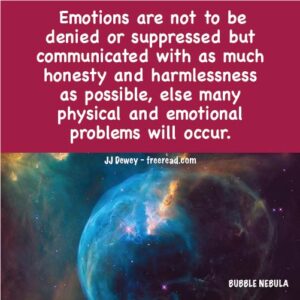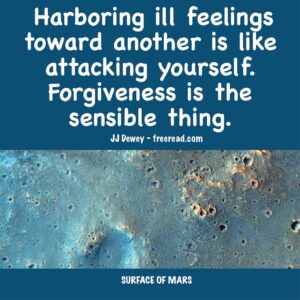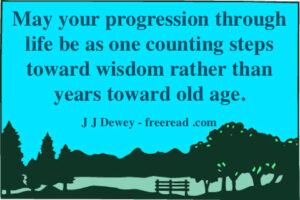
Suppression and Denial
2021 Gathering, Part Three
There are two things you can do to mismanage your emotions. You can deny them, or you can suppress them. Both approaches are harmful and they create psychological problems and physical problems. So, what do you think is the difference between denying an emotion and suppressing an emotion? Has anyone got a comment?
Joshua: They’re similar but denial is where you pretend you don’t even have the emotion. And suppression is sort of . . . you acknowledge it, but you push it down and don’t let it manifest.
JJ: Okay. That’s a good answer. What is it that makes a person deny rather than suppress? There are causes behind the denial and the suppression. People deny their emotions because they feel that being emotional is for the lesser evolved and they’re above that. “I’m above being jealous; therefore, I can’t be jealous because I’m above that. I’m an evolved spiritual being and therefore can’t be jealous.”
When their mate or romantic partner flirts with somebody else, and they still feel that twinge of jealousy, but they will deny it. “Wait! I can’t be jealous because I’m above that.” So, he denies that feeling of jealousy.
Now on the other hand, there’s suppression. And suppression happens most commonly with the emotion of anger. The person feels angry, but he realizes that anger is not good. So, what he does is suppress that anger. Then, if somebody hurts his feelings, and it makes him angry, he thinks, “well I shouldn’t really be angry because this creates problems. And because this creates problems, I’ll just pretend that nothing happened.”
Now this often happens with hurt feelings. Somebody will say something, and the guy goes a little quiet, and so you say, “is everything okay?” And the guy says, “yeah, I’m fine. No, no, no problem. None at all.”
But there is a problem. The problem was his feelings were hurt. He would like to say something, but he feels that he shouldn’t say something because that’s negative and he’s not a negative guy. So he suppresses that feeling. What happens when you suppress for so long?
Joshua: Cancer.
JJ: Yeah, cancer is one. It affects you physically, and suppression is a major cause of cancer. You notice, it’s amazing how many people that have cancer are really nice people. Almost everybody that dies of cancer, at their funeral, it’ll be talked about how wonderful they were and how nice and always pleasant they were. And they were always pleasant because when people hurt their feelings, when people said negative things toward them, and they felt like slapping them in the face, but they didn’t!
They held their temper, and they suppressed it. So that’s one reason people of die of cancer, one of the causes of which is suppression. These are considered very nice people because they never over-reacted, when they were attacked by somebody. They were always trying to be pleasant.
Now why would that be considered a fault by our higher self, to suppress our anger? Why would that be a problem?
Tyler: We’re denying a part of who we are.
JJ: Right. And this is a key to overcoming all of the obstacles on the spiritual path, is total honesty. In other words, if you’re feeling anger and you’re pretending that the anger is not there, it’s a deception. And all deception hinders the person on the spiritual path. It’s very difficult to be completely honest. So when someone makes you angry and you feel anger inside, what should you do? How can you express this harmlessly without creating a problem?
Darren: Acknowledge it and have compassion for it.
JJ: Yeah. Acknowledge it and have compassion. Let’s see. Let’s pick a couple together. Phil – now you and Rebecca seem like such nice people. It’s hard to imagine you two getting angry or upset with each other.
Audience: Inaudible remark (laughter)
JJ: Rebecca, have you ever gotten upset with Phil? He’s such a nice guy. It’s hard to imagine. But have you ever gotten upset with him?
Rebecca: I have.
JJ: Okay, what do you do when you get upset with him?
Rebecca: Yell at him.
JJ: (laughter) Okay. Well, that’s actually a lot healthier than holding it in.. . . My sister died of cancer. Wonderful woman. My brother-in-law I would guess was a little hard to live with at times. But my sister, she just acted like everything was cool all the time. Yet she died of cancer. So she probably had suppressed feelings; things that she did not express.
But you do express things, right? Does she let her feelings be known (speaking to Phil)?
Rebecca and Phil: They both acknowledge she does.
JJ: (laughter) Well that’s why you two have a glow about you. You’re honest with each other when you do have negative feelings. When he doesn’t put his socks away or whatever he does wrong, do you try to correct him in a harmless way where it doesn’t create total damage?
Rebecca: Yeah, I do. But I don’t do a very good job of that all the time. (laughter)
JJ: Yeah, it’s hard to do, isn’t it? Okay, when somebody makes you angry, there are three things you can do:
[1] One, you can attack them and choke them to death. In this case, you’ll be arrested and go to jail, so that’s not a good plan.
[2] The second thing you can do is suppress it. And that’s really bad for your health because it creates blockages of energy within your body. And these blockages of energy can create cancer, or other problems. All kinds of things can surface because of these blockages of energy.
[3] And the third thing you can do is communicate your feelings. And then what you do is communicate them as harmlessly as possible.
So if your mate or your friend or anybody says something to make you angry, you can approach them like this. You say, “hey, you said this to me, and that really hurt my feelings. Do you understand how that bothered me? And he may say, “yeah, I didn’t know that hurt your feelings at all. I’m sorry about that. And if he says that, that will diffuse the whole situation and make it go away.
Now, sometimes when you honestly communicate feelings the opposite will happen. The guy will get angry himself. You will release your feelings, and the guy will say, “well, what’s your problem? You shouldn’t get angry over that.
And then, what will happen is the negative energy that was hovering over the person that communicated his hurt feelings, the cloud, will be removed because he communicated his feelings honestly, for when he communicates, it just dissipates.
But if the other person doesn’t cooperate in the communication, and turns negative the cloud rests over him. And now, he’s feeling really put out. He’s angry because he feels that he’s attacked unjustly even though no attack was intended. This often happens sometimes, but it’s a chance you have to take.
If you feel anger and need to express it, and you do it honestly and the other guy reacts negatively, that’s just something you may have to deal with, but now you’re free. But the other guy now has the problem, and you might have to avoid him for a while, (laughter) because he’s going to go around with a cloud over him for a few days.
We identify so strongly with our feelings that it’s hard to disassociate ourselves from that identification, because when we feel something what do we say? We say, “I feel this.” It’s almost like, if I feel anger, it’s like saying, “I am anger,” or “I am jealous,” or “I am this.” Whereas you are not. You’re just using a vehicle. And your vehicle is responding to this emotion. It’s not the real you.
To search the website, containing millions of words, replace the word “search” with the word or phrase you want to find and place the entire line in the Google search box.
“Search” site:freeread.com
Easy Access to All the Writings
For Free Book go HERE and other books HERE
JJ’s Amazon page HERE
Check out JJ’s Facebook Group HERE
Follow JJ on Twitter @JosephJDewey HERE

